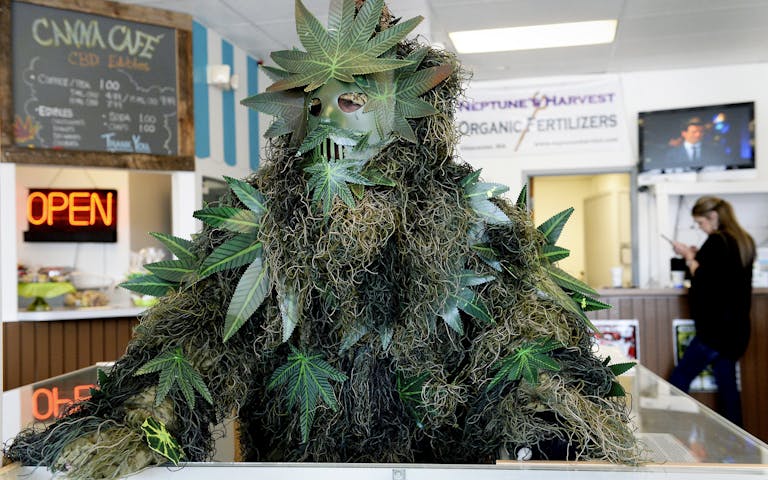SPRINGFIELD, MA—Seconds after I met Dave Mech, creator of the notorious Potsquatch, video-bomber of Massachusetts weather reports, and viral online persona, he presented me with an opportunity for a little participatory journalism.
“I want to get some video of you wearing the suit,” he told me, unfolding what looked like the shorn outer skin of some swamp creature.
“I’d like you to sorta stick your head out of the front door and look around while I film you. I’m making a music video with a band outta Cleveland and need some shots to edit in.”
Why not. I had made the trip to Potco, Mech’s CBD dispensary, café, retail store, infusion, and extraction center, to spend an afternoon in the habitat of the Potsquatch. I didn’t count on getting literally under the creature’s skin—but as a reporter you often just roll with the scene.
It was a biting cold day in Springfield, and I can tell you this about the infamous suit. It is a tactical ghillie suit draped in plastic, handmade cannabis fan leaves, which cascade like a lion’s mane around a green hockey-mask face. It is not warm.
America, Meet the Potsquatch

Potsquatch became an instant hit after he was caught on a local news report tromping through the streets of Springfield, MA, during a blizzard. (Jamie Cotten for Leafly)
Mech and his alter-ego-slash-brand-mascot burst into global view on Feb. 9, 2017, during a nor’easter unleashing snowy hell all over Massachusetts. Jennifer Pagliei, a meteorologist from local news station 22 News, was doing a live report from Springfield, not far from Potco’s storefront. Mech, seeing an opportunity for a little free media, donned the suit and slogged his way through shin-deep snow toward Pagliei.
The rest is history.
It was a clip ripe for social media, and in a few hours it had gone viral.
In early March, a another live news crew got Potsquatch-ed while covering the raid and shutdown of nearby dispensary Mary Jane Makes Your Heart Sing. Word got out that the store allegedly was charging customers an entry fee, then gifting sample bags of marijuana. (In Massachusetts, where the state voted in November to legalize cannabis for adult use, emerging state regulations and local oversight have made for hazy operations as organizations keep up with what’s tolerable and what’s not.) Potsquatch soon won the support of many at the raid, and his leafy face again stole the show.
Shop highly rated dispensaries near you
Showing you dispensaries nearSquatch’s Alter Ego: Dave Mech

Potco, David Mech’s grow-supply store, offers CBD-infused coffee, tea, and edibles. (Jamie Cotten for Leafly)
When the phone rings in Potco, Dave Mech is the guy who answers. “We sell CBD,” he told one caller, “but you can bring your bud down to be pressed for products and manufacturing.” At the end he closed the conversation with a cheery goodbye. “Yup. My name’s Dave. I’m the Potsquatch.”
The man behind the mask has always had a gift for promotion. Prior to opening Potco, Dave Mech made an living as an entertainment lawyer in the music business. He once spent three days snowed in with the Wu Tang Clan, which he describes as “a very fun three days.”
“Often it helps more than the prescribed pills and antipsychotics they are on.”
His interest in CBD and cannabis caregiving grew out of his earlier law practice, representing maritime workers and fishermen who suffered injuries while working off the coast of Gloucester, MA, in the 1980s. His mentor was a Gloucester fisherman, and Mech’s experience representing injured fisherman put him on the front lines of the heroin epidemic that devoured Gloucester, fed by opioid painkillers.
Some years later, Mech developed Clinic in the Clouds, a program he hoped would be a model to demonstrate how to get medical marijuana and CBD patients the care they need. Its function was to improve coordination across primary care doctors and psychiatrists, and even among opioid treatment clinics.
“It’s a big reason why I got into the medical end of cannabis and CBD,” he says. “There was no coordination of care, and anything with marijuana was considered taboo between physical and psychiatric doctors. There was a wall between them, and they needed to accept that it works, and often it helps more than the prescribed pills and antipsychotics they are on.”
When Massachusetts legalized medical marijuana in 2012, Mech began working with a flood of patients who said they were telling their psychiatrists they preferred CBD. The vast majority seemed to be coming in to treat anxiety or depression-related symptoms. “One in 10 had full-blown PTSD, and before coming in they weren’t even seeking treatment,” Mech said.
In 2013, as he was working toward opening a shop of his own, his back suddenly went out, the end result of decades of herniated-disc pain. “I was fighting to get a dispensary up and I couldn’t even get out of bed,” he recalled. He was forced to put the plan on ice. That’s when he met Bill Downing.
Bill and Dave’s Excellent Adventures

(Jamie Cotten for Leafly)
Downing was already a fixture in the underground caregiver and cannabis activist communities in Massachusetts. The two quickly hit it off.
“He seemed like a pretty smart guy and, when I met him, I walked into his basement and he had a full dispensary going,” Mech laughed. “He was different. He was going to do this no matter what.”
Mech and Downing began working in tandem, with Mech establishing Caregivers Connection and Downing servicing patients through his Yankee Caregivers platform. Downing was drawn to Mech’s sincerity, as well as the benefit of having a lawyer as a partner.
After a month of working as a collective, they were serving more than 1,200 patients. “Bill even had a secret hideout somewhere above the hills of Worcester where he kept his medicine,” Mech said with a giggle. Downing had been processing and distributing more than 20 pounds of cannabis per week, as well as hashish, topicals, bubble baths, lip balms, and other products. “I often had three full-time employees there, just packing up orders,” Downing told me over the phone.
Mech believed then that if done right, the caregiver model could replace the dispensary mess at the time, characterized in the current market by a slow slog of bureaucratic oversight. “That’s what people were doing, what people do in the community. It’s about caregiving first,” he said. Years later, patients around Massachusetts are still frustrated by obstacles to access, especially those far from the state’s few dozen dispensaries.
Then Mech and Downing’s joint caregiving project began to crash. Massachusetts authorities cracked down on local caregivers, filing civil enforcement actions against various groups. Downing’s dispensary was raided. Frustrated, Downing responded in 2014 by suing the Department of Health on grounds that the agency was attempting to eliminate the caregiver provision of the state’s medical marijuana law.
Mech ultimately broke off from his conjoined business partnership with Downing—though he’s still on good terms with the longtime advocate.
“Dave gave me legal advice, and moral support too,” Downing laughed over the phone. “He’s a believer in the cause. When you’re taking a lot of chances, it’s hard to find people to stand up with you,” he said. “Many times I remember just calling up and asking for [legal] advice. I never had to pay him for it. He just kind of helps.”

Doors Open, Patients Welcome
Early last year, Mech revived his dream of a storefront. He brought on a new partner, who came up with the concept of a CBD café. (The partner later left to open her own shop.)
“I‘ve lost a lot doing this stuff,” Mech said, “and I’ve learned that money or having boats and toys and so on wasn’t why I was doing this. The whole Potsquatch thing is to basically send a message that there’s a new way to look at things in this market, to think outside the box and chill a little bit.
“I think providers patients and caregivers need to be a unified community, and people outside need to see it,” he continued. “Potsquatch helps get the attention, and that gets people in here for the medicine they need.”
The Empathy Business

(Jamie Cotten for Leafly)
Most clients today come in for chronic pain. Others are sufferers of Crohn’s disease, and yet others are in the midst of cancer treatment. Even parents bring their children in after researching stories of the benefits of cannabinoids treatment for afflictions like childhood epilepsy.
At one point in the afternoon, a mother and daughter strolled in to Potco. They’d seen the Potsquatch lumbering through local news reports, and they were brimming with questions.
“We don’t want the stuff that gets you high,” the mother insisted.
After talking with them for quite some time, Mech recommended a few CBD products.
“You can’t cure cancer with it,” Mech explained, “but you can keep it and the pain at bay, and stuff like Rick Simpson Oil is known to shrink tumors to the point someone can live on it with a better quality of life.” He added: “It’s not cheap, but it works.”
The mother said she’d check with her daughter’s oncologist to ensure it wouldn’t cause unintended side effects. “A lot of doctors are willing to try it,” Mech said.
Mech sold them some homemade CBD oil and a few gummies and wished them good health. When the mom mentioned a family member suffering from chronic pain, he responded, “Just have her give me a call. I can help her out.”
An hour before closing, a scraggly couple sauntered in. Mech launched into descriptions of the products and, like many, the two haggled a bit over pricing. The couple settled on CBD coffee and brownies for the road, promising to spread the word about the shop and admitting they learned about its existence by accident, when looking up another CBD dispensary. I asked him if that bothers him at all, that after his struggles and setbacks, a competitor is benefitting from the attention his viral Potsquatch antics have brought to Springfield’s CBD district.
Mech shrugged. For him it’s just part of the developing legal cannabis landscape.
“They all want me here,” he said with the grin of a man who knows his strengths. “Because they know if they get raided, they’re going to want Potsquatch around.”






